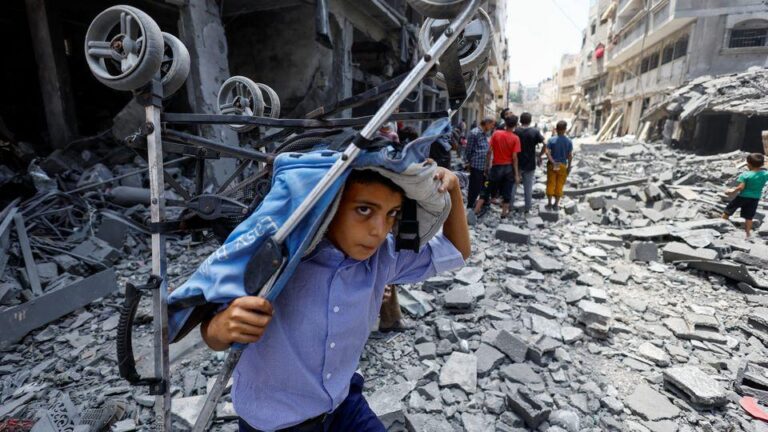As violence escalates in Gaza, Germany’s government finds itself navigating an increasingly complex and volatile landscape, facing mounting pressure from diverse domestic and international actors. Balancing diplomatic relations, humanitarian concerns, and public opinion, officials in Berlin are caught between competing demands for decisive action and cautious restraint. This article examines how Germany’s leadership is responding to the unfolding crisis, highlighting the political challenges and strategic calculations shaping its position amid one of the most contentious conflicts in recent memory.
Germany’s Diplomatic Tightrope Amid Gaza Conflict
Germany finds itself navigating a complex web of diplomatic pressures as the Gaza conflict intensifies. The government’s response is scrutinized by a broad spectrum of domestic and international voices, each demanding a stance that aligns with deeply held values and geopolitical interests. On one hand, there’s a strong push from certain parliamentarians and civil society groups advocating for unequivocal support for Israel’s right to self-defense. Conversely, human rights organizations and segments of the German public urge for immediate humanitarian aid and a firm condemnation of civilian casualties in Gaza. This polarization underscores the intricate balance Berlin must maintain to uphold its role on the global stage while addressing internal divisions.
Key Elements Influencing Germany’s Diplomatic Posture:
- Historical Accountability: Germany’s unique historical relationship with Israel shapes its cautious but resolute diplomatic approaches.
- Coalition Dynamics: The ruling coalition’s diverse makeup complicates consensus on policy direction.
- Public Opinion: Increasingly vocal protests and media coverage drive political responsiveness.
- European Union Unity: Pressure to maintain a coherent EU foreign policy stance while acknowledging national interests.
| Stakeholder | Primary Concern | Influence Level |
|---|---|---|
| German Parliament | Security and Diplomatic Balance | High |
| Human Rights Groups | Civilians Protection | Medium |
| Israeli Government | Military Support | High |
| European Union | Unified Foreign Policy | Medium |
Domestic Political Divides Challenge Chancellor Scholz’s Stance
Chancellor Olaf Scholz finds himself navigating turbulent waters as differing opinions within Germany’s parliament increasingly challenge his approach to the Gaza conflict. Members of his own Social Democratic Party express unease over Germany’s measured rhetoric and cautious support for Israel, pushing for a more balanced stance that also considers humanitarian concerns on the Palestinian side. Meanwhile, opposition parties seize the opportunity to highlight what they see as a lack of decisive leadership, further polarizing public debate.
Pressure also mounts from civil society groups and international activists demanding greater German involvement in mediating peace efforts. Key criticism points raised include:
- Calls for a clearer condemnation of violence against civilians
- Demands for increased humanitarian aid and support for Gaza’s civilian population
- Debate over arms exports to nations involved in the conflict
| Political Faction | Primary Concerns | Stance on Germany’s Role |
|---|---|---|
| Social Democrats (SPD) | Cautious diplomacy, humanitarian aid | Maintain balanced support, avoid escalation |
| Christian Democrats (CDU/CSU) | Strong backing of Israel’s security | Firm stance against Hamas |
| Greens | Human rights, arms export restrictions | Emphasize peaceful resolution and aid |
| Left Party (Die Linke) | Critical of German military involvement | Push for neutrality and humanitarian focus |
Calls for Balanced Humanitarian Aid and Strategic Dialogue Intensify
Amid mounting international concerns over the escalating crisis in Gaza, German officials are facing intensifying demands to recalibrate their approach to humanitarian support. Advocacy groups, political figures, and civil society leaders have urged the government to prioritize balanced aid distribution, ensuring that life-saving resources reach those most affected while minimizing political entanglements. These calls highlight the urgent need for transparency and accountability in aid channels, emphasizing the protection of civilian lives without exacerbating existing tensions.
Simultaneously, there is increasing pressure for Germany to engage in strategic diplomatic dialogues aimed at fostering sustainable peace and stability in the region. Stakeholders propose a multi-layered strategy encompassing:
- Active mediation between conflicting parties
- Collaborative regional security frameworks
- Enhanced cooperation with international organizations
- Long-term investment in reconstruction and development
These initiatives reflect a broader consensus that effective humanitarian aid must be coupled with meaningful efforts to address underlying political challenges.
| Key Demands | Focus Area | Expected Outcome |
|---|---|---|
| Equitable Aid Distribution | Humanitarian | Reduce civilian suffering |
| Diplomatic Engagement | Political | Conflict de-escalation |
| Regional Partnerships | Security | Long-term stability |
| Development Funding | Economic | Reconstruction support |
To Wrap It Up
As tensions in Gaza continue to escalate, Germany’s government remains caught between competing domestic and international pressures, striving to navigate a deeply polarized landscape. With public opinion divided and diplomatic stakes high, Berlin’s response will be closely watched both at home and abroad, highlighting the complexities facing European powers amid ongoing Middle East turmoil. The coming weeks are likely to test Germany’s ability to balance humanitarian concerns, alliance commitments, and internal political dynamics in a region fraught with volatility.




